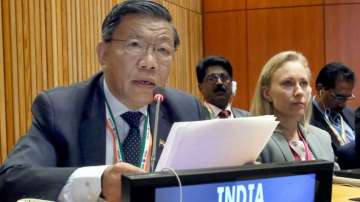India has urged the world organisation to overcome "narrow geopolitical interests" and adopt the Comprehensive Convention on International Terrorism (CCIT) that it has proposed.
Terrorism is an "alarming concern that impacts us all and requires effective international collaboration" to develop international law to combat it, Indian MP P.D. Rai told the General Assembly Committee dealing with legal matters on Monday.
"However, law-making on this issue continues to falter in view of narrow geopolitical interests," he said.
"Ironically, often states hide behind legal concepts, designed for different contexts, to stop progress on this vital issue, including here at the UN in the context of a draft CCIT," Rai, who belongs to the Sikkim Democratic Front and is the only MP from his state in Parliament, said.
General Assembly President Maria Fernanda Espinosa also made a forceful plea before the Committee to finalise the CCIT.
India proposed the CCIT in 1966 but negotiations on it have so far been unsuccessful because countries have not been able to agree on the definition of terrorism and terrorists, which would be essential for framing the law.
Some nations have claimed that certain categories of terrorists were "freedom fighters" and some terrorist organisations are "liberation movements" and, therefore, they should not be covered by international anti-terrorism law.
Espinosa told the Committee: "I would reiterate the need to implement measures to eliminate international terrorism, and to advance the Global Counter-Terrorism Strategy.
"As it is, the nature of terrorism has shifted. The world is seeing smaller, more frequent, more dispersed, less dramatic but equally as profound attacks. I, therefore, echo previous calls in this Chamber and stress the importance of finalising the draft CCIT."
Rai also called for reform of the Security Council so that the global governance structures reflect contemporary realities.
"The current UN structures were designed for a bygone era by a mere handful of nation states. For retaining legitimacy and effectiveness, fundamental reform of these structures, especially the Security Council, is needed."
Rai is among a group of MPs who are members of the Indian delegation to the General Assembly session.
Latest India News

